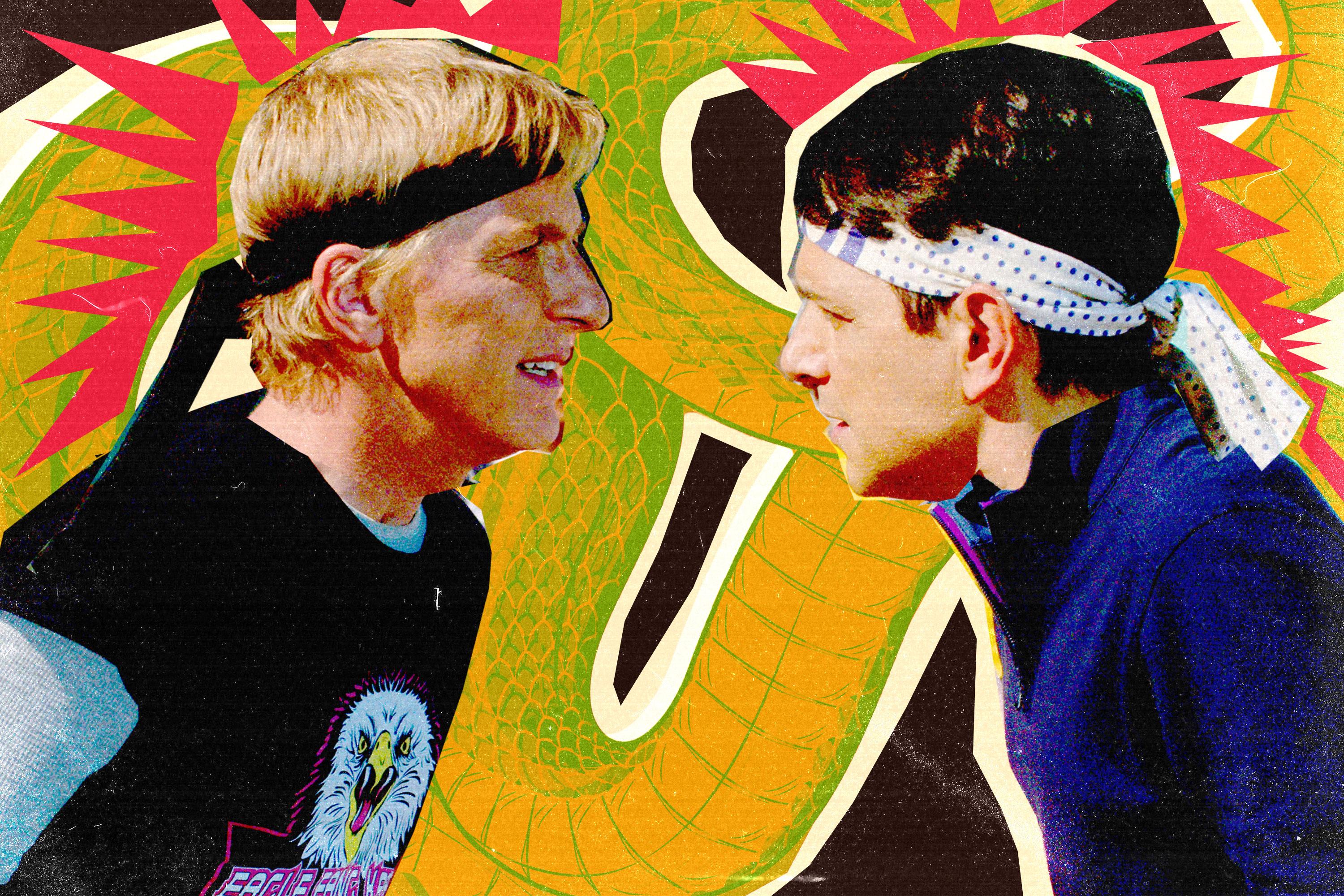
If the Streaming Wars are a karate tournament, then Netflix has repeatedly found itself on the receiving end of a leg sweep in 2022 thanks to subscriber losses, layoffs, and a cratering stock price. The fourth season of Stranger Things might have offered a reprieve from the streamer’s string of bad publicity earlier this summer, but the binge release model means that even its most popular shows can stem the tide for only so long. Thankfully for Netflix, it has an original series returning on Friday that feels right at home fighting against the odds—it’s time for Cobra Kai to step back onto the streaming mat.
While it’s unsurprising that a TV sequel to The Karate Kid franchise has proved to be popular in an era when IP is king, it’s certainly been shocking that Cobra Kai is actually pretty good. Following former high school bully and Karate Kid villain Johnny Lawrence (William Zabka) opening up a dojo for a new generation of outcast teens, Cobra Kai juggles franchise callbacks while underlining the importance of moving on from the past. Along the way, Johnny transforms from an amusing collection of old-school jock stereotypes into a sympathetic antihero finally picking up the pieces of his life. Seeing Johnny meaningfully grow alongside his pupils, particularly his neighbor and surrogate son Miguel Diaz (Xolo Maridueña), is one of the most rewarding elements of the show.
Of course, what really makes Cobra Kai work as a binge-worthy dramedy is how it’s managed to bottle up ’80s-era cheese and repackage it for the 21st century. There’s a self-awareness running through the series that nobody should be this obsessed with teens practicing karate—Cobra Kai is clearly delighted by the absurdity of its own premise and carries itself like an elevated soap opera. (It’s not that far removed from the theatrics of WWE, either.) But if you’re willing to buy into karate having an outsize influence on an entire Los Angeles community, Cobra Kai also demonstrates how the sport can perpetuate a cycle of toxic masculinity from people who practice it in bad faith and pass it down across generations.
While Johnny doesn’t have a stellar track record as a sensei—it’s probably not a good idea to ask students to jump between buildings—the character’s troubles stem from his rocky relationship with his former sensei, John Kreese (Martin Kove). The original founder of Cobra Kai, Kreese is a Vietnam War veteran who never let go of his wartime trauma, calls his karate pupils “soldiers,” and earnestly believes political correctness is ruining society. (I’m somehow not kidding: After the January 6 insurrection, The Los Angeles Times published an op-ed about how Cobra Kai can teach people to deal with extremists.) Johnny’s long road to redemption on the series began with rejecting Kreese’s “no mercy” karate ethos and realizing there is more than one way for students to show off their strength, though not before his former sensei stole the new Cobra Kai dojo out from under him. But after establishing karate as ground zero for a multigenerational culture war, Cobra Kai is setting its sights on a new enemy in Season 5: capitalism.
Having framed Kreese for a violent assault against one of Cobra Kai’s students at the end of the fourth season, returning Karate Kid Part III villain Terry Silver (Thomas Ian Griffith) takes the dojo for himself with grander aims in mind than local karate feuding. A successful businessman before Kreese brought him back into the fold as his right-hand man in Season 4, Silver plans to turn Cobra Kai into a global brand: a franchise synonymous with karate not unlike, well, The Karate Kid. By the start of the fifth season we discover what Silver’s deep pockets have done for Cobra Kai in the San Fernando Valley: Their state-of-the-art dojos have smoothie bars, in-house protein snacks, and tons of merchandise. (I will confess to wanting to cop a Cobra Kai hoodie.) All the while, Cobra Kai students continue to learn karate with the express purpose of inflicting harm on others. (That being said, Cobra Kai still knows how to have fun: With such rapid dojo expansion, Silver recruits an army of senseis that includes a man with an eyepatch.)
Coming across like a Bond villain with a black belt, Silver slots in nicely as Cobra Kai’s new big bad, bringing the same cruelty as Kreese with the added dimension of treating karate primarily as a business opportunity. Silver’s profit-driven philosophy stands in stark contrast to the ways of Miyagi-Do passed down by the original Karate Kid Daniel LaRusso (Ralph Macchio), which focus on self-defense and self-improvement. (Johnny’s second dojo, Eagle Fang, has the slightly less noble goal of instructing kids to be badasses without being assholes.) Obviously, neither Johnny nor Daniel agree with Silver’s methods, which allows them to set aside their differences against a common enemy with the help of reformed Karate Kid Part II villain Chozen Toguchi (Yuji Okumoto).
As befitting a franchise that loves an underdog, these former foes are looking to punch (crane kick?) above their weight and stop Silver before he takes Cobra Kai global. But with the potential of expanding its purview beyond the San Fernando Valley, the larger stakes this season have been a refreshing shake-up for the series. Cobra Kai had settled into a familiar pattern—an All-Valley tournament every two seasons, its angsty teen ensemble switching dojo allegiances, Daniel and Johnny flirting with a decades-old karate rematch—that appeared to exhaust all possibilities within the show’s small slice of L.A. For Cobra Kai to evolve, it needed to follow Silver’s lead and think bigger.
To that end, Season 5 begins laying the foundations for the warring dojos to compete in the Sekai Taikai: a tournament that is essentially the Champions League of the karate world. (Sekai Taikai is also the title of a Dragon Ball Z video game, which, seeing as Cobra Kai might be the closest thing we have to a live-action anime, is a nice bit of franchise symmetry.) While we won’t see the Sekai Taikai until the sixth season—assuming Netflix renews the show—the idea of a single competition that could determine the fates of all these characters feels both incredibly melodramatic and extremely on-brand. More importantly, it may signal the beginning of the end for Cobra Kai. It’s hard to imagine Cobra Kai one-upping an international karate tournament in the future—note: I would absolutely watch a season in which Johnny joins NASA to create a dojo to train astronauts on the moon—which makes the sixth season seem like a natural endpoint for the series.
While Cobra Kai nearing its conclusion is undeniably bittersweet, the fact that the show has made it this far and built up so much goodwill is an impressive underdog story in and of itself. Despite strong reviews from the jump, Cobra Kai appeared destined to fade into obscurity as part of YouTube’s short-lived original programming wing before Netflix swooped in to acquire the series. Since then, the show has unexpectedly revitalized a long-dormant franchise, going so far as to claim an Emmy nomination for Outstanding Comedy Series in 2021. (Seriously, imagine telling someone five years ago that the Emmys would recognize a TV sequel to The Karate Kid.)
But for all the show’s success and genuine reverence for its legacy characters, Cobra Kai would do well to avoid the franchise’s familiar pitfalls—namely, spinning its creative wheels just to spend more time in its karate-obsessed universe. (Let’s be honest: None of the Karate Kid sequels are good; some of them are barely watchable.) Even though it’s thrown in plenty of callbacks to the original films, Cobra Kai has seemed to absorb all the right lessons about how to wield nostalgia without being completely beholden to it.
I truly can’t wait for Cobra Kai’s sixth season, and I’d be willing to challenge a Netflix executive to a fight if they dare cancel the series. But once Cobra Kai gives its characters an opportunity to show off their moves on karate’s biggest stage, there’s no shame in hanging up the gis for good.


